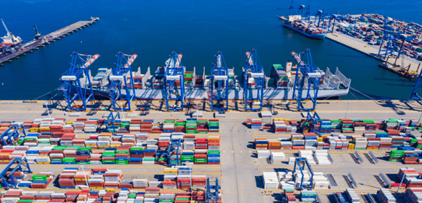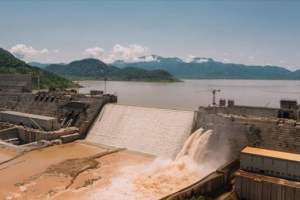
Ethiopia’s quest for sea port bases is built on the principle of mutual benefits with a focus on pursuing solutions that can lead to shared development and mutual gain for all stakeholders involved. Ethiopia’s search for sea port options has been driven by a variety of factors including the need to diversify its trade routes and reduce dependency on a limited number of ports.
By establishing partnerships and collaborations with neighboring countries, Ethiopia can diversify its sea port access, increase its trade and economic growth and strengthen its position as an important regional player.
Ethiopia’s pursuit of sea port bases is guided by a long-term vision for sustainable development. Recognizing the limitations posed by its landlocked status, the country aims to leverage maritime access to foster economic growth, create job opportunities and improve the overall standard of living for its citizens. By actively seeking solutions that prioritize shared development, Ethiopia demonstrates its commitment to inclusive growth and social progress.
Ethiopia’s quest for sea port bases is rooted in the principle of mutual benefits with a strong emphasis on pursuing solutions that can lead to shared development and mutual gain for all stakeholders involved. Through this strategic approach, Ethiopia aims to enhance its connectivity, foster regional cooperation, attract investment, support sustainable development and contribute to global trade and geopolitics.
Building a sea port can also lead to many economic benefits including generating employment opportunities, increasing the standard of living of its citizens and helping to develop the transport industry. Ethiopia’s economy is primarily agricultural-based and access to the sea can help the country diversify its products and create new export opportunities.
The need for improved access to the sea by Ethiopia is not restricted only to trade growth but also for creating better regional integration. Ethiopia has been making several efforts to boost its economy and regional economic integration. Access to the sea, therefore, presents Ethiopia with an opportunity to make an exponential step towards achieving these goals.
Lack of access to a sea port hinders Ethiopia’s economic growth as it has to rely on road and rail transport which is time-consuming and costly. Ethiopian exporters have to resort to transit routes operated by neighboring countries, which adds additional costs and time. This, in turn, makes it difficult for Ethiopia to compete with countries with direct access to the sea.
By pursuing solutions that can lead to win-win outcomes for all parties involved, Ethiopia is promoting greater regional cohesion and contributing to a more stable and secure Horn of Africa region. In a similar vein, Ethiopia’s quest for alternative sea port facilities is an important aspect of its efforts to promote security, economic development, and other related aspects in the Horn of Africa region.
By collaborating on the development of sea port infrastructure, Ethiopia can create an enabling environment for greater cooperation and partnership, promoting regional stability and reducing the risk of conflicts and tensions. This desire to build strong relationships is rooted in Ethiopia’s history and culture which places a high value on collaboration and collective achievement.
This can involve collaborating on the construction of sea port facilities as well as the development of related infrastructure such as rail, road, and energy networks. In pursuing these partnerships, Ethiopia recognizes the importance of mutual benefit and shared development. To ensure that its quest for sea port options is aligned with the principles of mutual benefit and shared development, Ethiopia has emphasized the importance of transparency and accountability in negotiations with partner countries.
By working together towards shared goals and leveraging each other’s strengths and resources, countries in the Horn of Africa region can create a more inclusive and dynamic economic landscape promoting greater security and prosperity for all. Moreover, by promoting sustainable and responsible infrastructure development, Ethiopia and its partners can contribute to a more environmentally friendly and ecologically sustainable region.
Ethiopia’s pursuit of alternative sea ports is rooted in a desire to build stronger relationships with neighboring countries and promote mutual growth and development. By fostering collaboration and partnership, Ethiopia can contribute to a more stable, inclusive, and prosperous Horn of Africa region, promoting greater social, economic, and cultural integration across the continent.
By collaborating on the development of sea port infrastructure with neighboring countries, Ethiopia can promote greater cultural exchange and understanding, fostering a deeper sense of shared identity and belonging across the region. There is no denying the fact that Ethiopia’s quest for sea port bases is founded upon the principle of mutual benefits with a strong emphasis on pursuing solutions that can foster shared development and mutual gain for all stakeholders involved.
Through collaborations with international partners, Ethiopia can tap into expertise and best practices in maritime logistics, port management, and trade facilitation. This knowledge transfer can enhance Ethiopia’s institutional capacity and promote the development of a skilled workforce in the long run driving shared development and mutual gain.
By enhancing its maritime connectivity, Ethiopia can facilitate trade flows within the continent. This strategic positioning presents ample opportunities for job creation, infrastructure development and technological advancement all of which contribute to shared prosperity and mutual gain.
The landlocked nature of Ethiopia necessitates alternative avenues for maritime connectivity. With no direct access to the sea, the country has recognized the importance of establishing sea port bases to facilitate trade and economic growth. By seeking these bases, Ethiopia aims to enhance its connectivity to global markets, thereby boosting its trade potential and enabling the diversification of its economy. By actively seeking solutions that prioritize shared development, Ethiopia demonstrates its commitment to inclusive growth and social progress.
The population growth has led to a significant increase in the demand for various resources and opportunities, and Ethiopia is struggling to keep up with this demand. This has made Ethiopia realize that gaining access to the sea is not simply a luxury but is crucial to the survival and well-being of its expanding population.
The country’s geographical location poses several challenges to its economy and development. The country has limited access to the international market, and as a result, there is limited opportunity for growth. The presence of landlocked neighbors further compounds this problem as it makes Ethiopia rely heavily on these countries for its import and export needs.
Ethiopia’s quest for sea port is based on the principle of mutual benefits and partnership that provide amicable opportunity to strengthening shared development.
In his presentation entitled “from a drop of water to the sea, prime Minister Abiy Ahmed stressed that the issue of access to the sea and ports is not a matter of luxury but a vital prerequisite for the survival of the nation.
Accessing sea port is a legitimate question and is based on the peaceful development of these sea ports.
Instructor and researcher on Political Science and International Relations at Dire Dawa University, Surafel Getahun, told ENA that Ethiopia’s quest on alternative port facilities in not only a matter of international relations but is also a basic precondition for the security and development of the country.
He added that in terms of population, geopolitical location, economic development, Ethiopia is a country that can impart greater influence in the region.
He noted that as Ethiopia is a landlocked country, the nation is subjected to exorbitant payments for port services in her export and import transactions.
In order to fill the gaps in her economic status, the issue of acquiring and expanding port facilities or having access to alternative port options is of crucial importance, he remarked.
The researcher indicated that the proposal forwarded by Prime Minister Abiy Ahmed is based on the principle of give and take and shared development of ports for mutual benefits.
He further noted that Ethiopia’s quest for sea ports will create an enabling environment for strong relationship with countries and fulfillment of mutual goals.
The researcher concluded that the government should exhaustively utilize all possibilities including diplomatic and peaceful means to be able to obtain sea ports.
BY STAFF REPORTER
THE ETHIOPIAN HERALD WEDNESDAY 25 OCTOBER 2023





